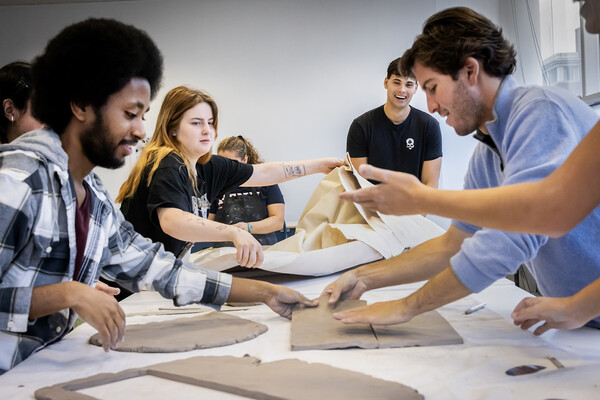To the Wire for Quiz Kids
The buzzer sounded. Regulation play had ended. The whole crowd sat on the edge of their seats waiting to see who would be declared the winner of the first ever National Academic Quiz Tournament (NAQT). Run similarly to the NCAA basketball tournament, the competition started at Penn Friday, with 64 college teams answering batteries of questions on topics ranging from classical studies to modern rock music a la the old "College Bowl" television show. And now it was down to this.
The score was dead even: 265 for Harvard, 265 for the University of Chicago. But, unlike at a basketball game, there would be no overtime until the judges sorted out two protestsÑone of them involved a translation from CzechÑmade during the game, one by each team. As the judges consulted, the players sat and talked animatedly among themselves, preparing for whatever was to come. The audience of 100 plus, crowded into Room A-1 of the David Rittenhouse Laboratory, was abuzz, excitedly debating who they thought would win. Finally, the judges tapped on the microphone and the crowd hushed. The previous rulings had been upheld; the score was still knotted.
Now it was time to get serious. There were three "toss-up" questions, and whoever buzzed first got to answer. Chicago took the first one: Robert Rich won an Oscar for Best Screenplay in 1956 for "The Brave One" but never claimed his reward. That's because there was no Robert Rich. Name this member of "Hollywood Ten" who sneaked himself onto the nomination list by using a pseudonym, who is best known for his 1939 antiwar novel, "Johnny Got His Gun."
Answer: Dalton Trumbo.
Then Harvard lost five points in a penalty for buzzing in before the next question was completed. They were 20 points behind and had no chance for recovery.
The Chicago players jumped to their feet, hugging each other and screaming in excitement as supporters rushed to congratulate them. John Sheahan, a law student at Chicago, summed up his team's feelings. "We're shocked, but it feels great that we won."
Patrick Matthews, one of the tournament organizers who got hooked on quiz bowls while an undergraduate at Penn, was elated by the success of the tournament, which was notable for attracting teams from around the country as well as one from overseas. Imperial College of the University of London, the reigning British quiz champions, dispatched a team, which finished 13th.
Penn was picked because it is a hotbed of quiz tournaments, having hosted a similar, 64-team tournament on campus last winter. But that tournament drew mostly teams from the East.
For this tournament, the new NAQT committee provided the questions and set the requirements, and the participating teams first had to qualify at sectional tournaments to win the right to compete at Penn, which, as the host, was an automatic qualifier. (The Quakers finished 52nd.)
As with any large and complicated event, there were delays, some caused by double-booking of rooms where early-round matches were scheduled to be played. But those glitches were minor and forgotten in the excitement of the tense, final-round match.
Matthews and his NAQT colleagues have plans for bigger, better, more broadly based tournaments in future years. "We're looking to cover all the English speaking world," Matthews said.








